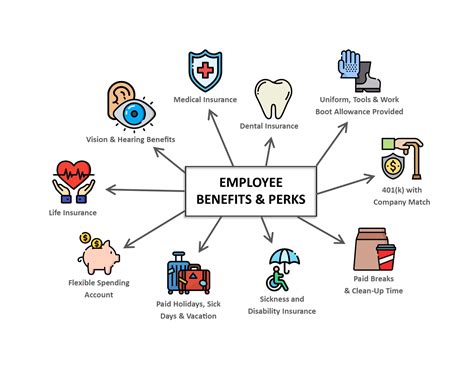Exploring Employee Benefits And Perks

Employee benefits and perks are an essential part of any job offer. They not only attract new employees but also retain existing ones. However, not all benefits and perks are created equal, and what works for one company may not work for another. In this post, we’ll dive into the world of employee benefits and perks and explore the different options available.
Types of Employee Benefits
1. Health Insurance
Health insurance is a crucial benefit that covers medical expenses and helps employees take care of their health. It can be offered in different forms, such as HMO, PPO, or POS plans. Some companies may also provide dental and vision insurance as part of their health benefits package.
2. Retirement Plans
Retirement plans are another common benefit offered by companies. These plans help employees save for their future and can come in the form of a 401(k) or pension plan. Some companies may also offer matching contributions to the retirement plan, which is an added perk.
3. Paid Time Off
Paid time off (PTO) is a benefit that allows employees to take time off work without losing pay. This can include vacation days, sick days, and personal days. The amount of PTO offered can vary depending on the company and the employee’s tenure.
4. Flexible Work Arrangements
Flexible work arrangements are becoming increasingly popular, especially with the rise of remote work. These arrangements can include flexible schedules, telecommuting, or job sharing. They provide employees with greater flexibility and work-life balance.
5. Employee Assistance Programs
Employee assistance programs (EAPs) are designed to provide employees with support for personal and work-related issues. This can include counseling, financial advice, legal services, and other resources. EAPs can help employees deal with stress, anxiety, and other mental health issues.
Types of Employee Perks
1. Wellness Programs
Wellness programs are a type of employee perk that focuses on promoting health and wellness. This can include gym memberships, healthy snacks, and wellness events. These perks can help employees stay healthy and reduce healthcare costs for the company.
2. Employee Discounts
Employee discounts are a popular perk that allows employees to purchase products and services at a discounted rate. This can include discounts on company products, partner products, or local businesses. Employee discounts can help employees save money and boost morale.
3. Professional Development
Professional development is a perk that provides employees with opportunities for growth and development. This can include training programs, mentorship, and tuition reimbursement. Professional development perks can help employees advance their careers and improve their skills.
4. Office Amenities
Office amenities are perks that make the workplace more comfortable and enjoyable. This can include free snacks, coffee, and other refreshments. Some companies may also provide game rooms, nap pods, or other fun amenities. Office amenities can help improve employee satisfaction and morale.
5. Company Events
Company events are a type of employee perk that provides social opportunities for employees. This can include holiday parties, team-building exercises, and company outings. Company events can help foster a sense of community and improve employee engagement.
Conclusion
Employee benefits and perks are an important part of any job offer. They can help attract and retain employees, improve morale, and reduce healthcare costs. When designing a benefits and perks package, companies should consider the needs and preferences of their employees. By offering the right benefits and perks, companies can create a happier, healthier, and more productive workforce.
FAQs
Q: What are employee benefits?
Employee benefits are non-wage compensations provided to employees in addition to their regular pay. These benefits can include health insurance, retirement plans, and paid time off.
Q: What are employee perks?
Employee perks are additional benefits provided to employees beyond their regular benefits. These can include wellness programs, employee discounts, and office amenities.
Q: Why are employee benefits and perks important?
Employee benefits and perks are important because they can help attract and retain employees, improve morale, and reduce healthcare costs. They can also help create a happier, healthier, and more productive workforce.
Q: How do companies decide which benefits and perks to offer?
Companies decide which benefits and perks to offer by considering the needs and preferences of their employees. They may also look at industry standards and what their competitors are offering.
Q: Are benefits and perks the same for all employees?
Not all benefits and perks are the same for all employees. Some benefits, such as health insurance, may be offered to all employees, while others, such as tuition reimbursement, may only be offered to certain employees.
